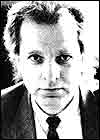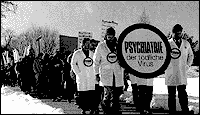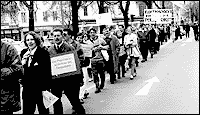
|


he Church of Scientology and its parishioners are notably active advocates in the field of human rights. Scientologists who subscribe to the religion’s Aims and Creed (and all do) find themselves instinctively opposed to those who abuse their power or who harm the innocent and the weak. Furthermore, the Creed of the Church states that the healing of mentally caused ills should not be alienated from religion or condoned in nonreligious fields.
As early as 1950, L. Ron Hubbard, the Founder of the Scientology religion, brought to light the savage abuses taking place in the field of mental healing, a field in which psychiatrists relied on electroshock, lobotomy and powerful mind-bending drugs to control human behavior in the name of help. Nor did it take Scientologists long to realize that it was harmful to force an ice pick or thousands of volts of electricity through the brain, or to flood the body with psychotropic drugs, and that this so-called “help” was nothing less than betrayal of the worst kind. Scientologists became outspoken critics of these abuses of the helpless.
What also soon became obvious was that psychiatry had no proven methods to justify the billions of dollars of funds governments poured into its coffers. This is a fact psychiatrists do not want the public to know. Literally, there are no reported cures for the thousands of purported mental ills psychiatry has received these billions to cure. But perhaps because of these very dollars, it was also a field which refused to institute reforms or take responsibility for its actions.
Instead, psychiatrists hire the best-connected PR firms to pretty themselves up to the public, while also using these same PR firms to arrange hatchet-job media attacks on anyone attempting to expose their fraud.
The Church thus formalized its opposition to abusive psychiatric practices and formed the Citizens Commission on Human Rights (CCHR) in 1969. CCHR now has grown to 118 chapters in 27 nations. For more than 26 years, CCHR has successfully exposed psychiatric murders, hospital fraud, sexual abuse and inhumane conditions in mental institutions, and have been instrumental in passing legislation protecting the civil rights of mental patients.
As a result of CCHR’s work in Germany, it was discovered that psychiatrists who had participated in the Nazi euthanasia program had escaped trial and in many cases continued to practice psychiatry, while colleagues kept silent about their identity. (See “The Story Behind the Controversy,”.)
In the 1970s, CCHR provided California legislators with documents and witnesses which led to the exposure of more than 100 unreported deaths at two State psychiatric institutions.
A 10-year CCHR probe of the Chelmsford psychiatric hospital in Sydney, Australia, revealed that scores of patients had died due to “deep sleep” —a drug-induced comatose state during which electric shock was administered. After a Royal Commission inquiry, sweeping reforms of Australia’s psychiatric industry came about, including a ban on deep sleep “therapy.”
In Italy, several mental institutions described by media as “worse than concentration camps where patients lived no better than animals” have been shut down due to CCHR’s efforts. And in the United States, CCHR has contributed to legislation criminalizing psychiatric rape in more than a dozen states.
In South Africa in the 1970s, CCHR researchers discovered and made known to the world the presence of camps in which black mental patients were detained and forced into slave labor in atrocious conditions, all for the profit of a private organization which absorbed about one third of the South African mental health budget. Photographs revealing the appalling conditions at these camps shocked the international community. Investigations by the World Health Organization and the United Nations Commission on Human Rights confirmed the atrocities. Today, following representations by CCHR, the post-apartheid South African government has opened an investigation into the camps.
In the years since it began, CCHR has become recognized as a relentless and effective foe of psychiatric barbarism in many countries, successfully exposing psychiatric abuses and pressing for reforms.
A United Nations report issued in 1986 on the subject of the human rights of mental patients stated, “CCHR has been responsible for many great reforms. At least 30 bills throughout the world, which would otherwise have inhibited even more the rights of mental patients, or would have given psychiatry the power to commit minority groups and individuals against their will, have been defeated by CCHR actions.”
Due to CCHR’s efforts, the United Nations finally adopted a universal bill of rights for mental patients in December 1991. It called on all nations to restore human rights “through appropriate legislative, judicial, administrative, education and other measures.”
While this was a major step forward, CCHR will continue to ensure that justice takes place wherever violations of these basic human rights occur.
1. CCHR = Citizens Commission on Human Rights was established by the Church of Scientology in 1969 to expose and eradicate psychiatric abuses of human rights.
|

|
![]()




